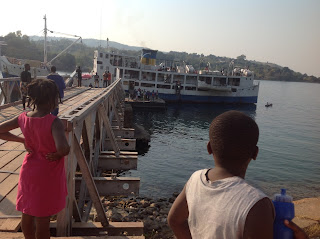Women's under-representation in Chakwera's Parastatal boards explained
The appointment of 38 percent women into Malawi President Lazarous Chakwera’s 31-member cabinet a first for the Southern African country, though slightly shy of the 40:60 prescription, gave gender rights activists what they thought was a glimpse into a new world of greater inclusion.
But the announcement of new board compositions for state-run entreprises, took them aback as an analysis of the appointment showed that women had been grossly underrepresented. So I, Chisomo Ngulube (CN) sought a reaction from University of Malawi senior lecturer senior lecturer of Political and Administrative Studies (PAS) Dr Tiyesere Mercy Chikapa (TMC).
By the way Tiyesere and I were in the class of '98 at St Mary's Secondary School in the cool city of Zomba, Malawi which also happens to be my home district; both my parents are from there. I call Tiyesere prof. regardless of the fact that she's yet to be made one by her university!
CN: What might have influenced who to appointment into the boards?
TMC: We cannot rule out merit as one of the factors to have influenced the choices of those appointed into the boards. However, I still feel loyalty to the Tonse Alliance cause might have also determined who to be appointed. For example, during the 23 June, 2020 Fresh Presidential Elections, I had an opportunity to play a role of an independent observer which gave me an opportunity to visit polling and tally centres. I saw a lot of professionals participating in monitoring and counting or tallying of votes. Mostly, these were working for MCP/UTM. I have seen names of some of those professionals in the boards. So, I think we are not very far yet from what has been happening in the past: being given positions as a reward for the support rendered during dark days.
CN: Women are missing from the boards of key organisations such as MERA, Macra, ESCOM, Admarc how would you explain that?
TMC: There is generally a tendency to leave appointments to key positions in society to men. In terms of organisational hierarchies, women are generally underrepresented in higher levels of the bureaucratic ladders due to among others, biases associated with promotion practices. Men tend to be the ideal first choice candidates for any higher-level position. Following the same understanding, it would also explain why men have been prioritized in key organisations. In general, such kind of political appointments are more likely to be made in favor of male political cronies who will be placed in key organisations. Women are missing in key organisations as they might not have been seen as the first-choice candidates to key organisations by those responsible for the appointments.
CN: How would you also explain their (women’s) appointment into more traditional roles like education where some are even chairpersons?
TMC: Women are associated with roles that facilitate nurturing like nursing and education and in the context of Malawi’s formal employment, these industries have slightly more women than the case is in other industries. As such, since the pool to draw from is slightly bigger, that would explain why more women would find their way into boards in those industries.
CN: Are the appointments not just a reflection of women's position in society. Is it possible to muster the 50 percent or more being demanded?
TMC: The current under-representation of women in the parastatal boards and complete non-representation in key parastatals indeed reflects a wider societal problem, where women’s position in society is subordinated to that of men. The gender Equality Act of 2013 provides for a gender quota threshold of 40:60. At the moment, most of the boards fall short of this requirement, just like the cabinet appointments, frustrating efforts towards the advancement of the gender equality agenda.
CK: Do we really need to have more women in boards or other public positions beyond just attaining the numbers?
TC: Malawian population has more women than men. Yet, for a long time, men have dominated the public arena like parastatal boards and neglected women’s issues and interests in the discussions. Coming from a background where women’s interests took a subordinate position in discussions dominated by men, it is assumed that women issues are best represented by other women. Therefore, it is expected that an increase in numerical female representation in such boards working hand in hand with men will generate an effect on policy processes and outcomes that take into account interests of both men and women in Malawi. So yes, we need to have more women in parastatal boards as this also magnifies women’s voices among men.


Comments
Post a Comment